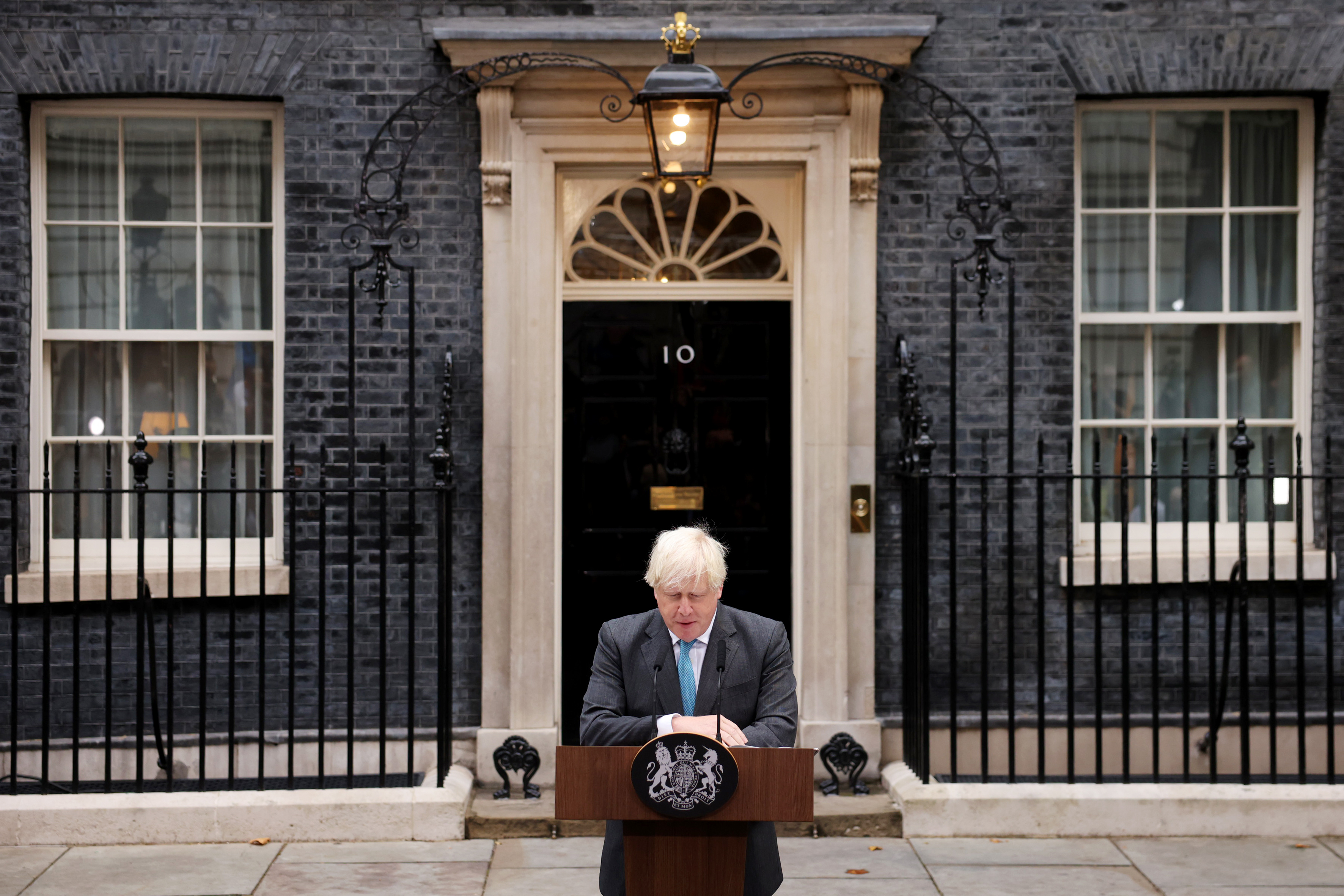The end of the line for Boris Johnson?
Johnson's effort to defend himself has some pundits forecasting the end of his political career


A free daily email with the biggest news stories of the day – and the best features from TheWeek.com
You are now subscribed
Your newsletter sign-up was successful
Months of recriminations over Britain's "partygate" controversy crescendoed this week with a hearing before the House of Commons' powerful privileges committee in which former Prime Minister Boris Johnson defended his actions during the scandal, one of several that contributed to his exit from the job under pressure last year. Johnson, his political future on the line, said during the three-hour hearing that he acted in "good faith" and never intentionally misled Parliament when he said as news of the scandal broke that no illegal gatherings had taken place at his Downing Street offices. "Hand on heart," he said. "I did not lie to the House."
Johnson started out defiantly, saying the effort to hold him in contempt of Parliament was "manifestly unfair" because lawmakers have found no evidence he was warned in advance anything illegal was happening at No. 10 Downing Street. He said a photo of him surrounded by colleagues with drinks showed that "perfect social distancing" wasn't observed, but argued that gathering was essential for work. He said if it was "obvious" that people were breaking lockdown rules, as critics in Parliament have argued, other top officials in his government including current Prime Minister Rishi Sunak would have known what was going on, too. Sunak was Johnson's chief financial minister, and his resignation last July set Johnson's downfall in motion.
The proceedings took a turn for the worse for Johnson when members of his own Conservative Party started grilling him. Conservative MP Alberto Costa said Johnson should have relied on senior civil servants to make sure everything in his office was being done by the book, instead of hiding behind the advice of aides as a "deflection mechanism." Committee Chair Harriet Harman of the opposition Labor Party said Johnson's effort to defend himself was "flimsy." The Scottish National Party's deputy leader in the House of Commons, Mhairi Black, said Johnson's "absurd claims were exposed as not remotely credible" under interrogation. "Most people watching will conclude it's now beyond doubt that the Tory former prime minister not only broke the law but also deliberately misled Parliament," she said.
The Week
Escape your echo chamber. Get the facts behind the news, plus analysis from multiple perspectives.

Sign up for The Week's Free Newsletters
From our morning news briefing to a weekly Good News Newsletter, get the best of The Week delivered directly to your inbox.
From our morning news briefing to a weekly Good News Newsletter, get the best of The Week delivered directly to your inbox.
'Nothing lasts forever'
"Boris Johnson's political career ended" before our very eyes just now, said Tanya Gold in Politico, "with stuttering and fake politesse." Johnson's "famous bonhomie" has gotten him out of pickles all his life, but it failed him when he needed it most. Johnson needed a serious defense "against the charge that he repeatedly lied to parliament when he said guidance was followed in No. 10." Instead all he could muster was "distraction," smokescreens, and "sentences that tripped along ring roads, going nowhere." He gave the committee no reason not to rule against him, which could cost him his seat. Oh, well. "Nothing lasts forever."
Conservatives and rightwing journalists had hoped it was going to "be the day Johnson launched his recapture of the Tory party from Rishi Sunak," said Martin Kettle in The Guardian. But his allies, and even his enemies, made a fatal error by assuming that the members of the Commons privileges committee "would be partisan pushovers. "Instead, the MPs calmly and devastatingly sliced and diced Johnson and the evidence about Downing Street COVID gatherings he has given this week." But Johnson's disastrous day was a gift to Sunak, who only got the job because his predecessor, Liz Truss, imploded so quickly. "Sunak has no reason to fear Johnson" anymore.
Johnson's political obituary is premature
This could indeed cost Johnson his seat in Parliament, in theory, said Martin Ivens in Bloomberg. "If MPs vote to suspend him for 10 days or more," voters in his constituency "will be entitled to hold a recall petition to trigger a by-election. If he's defeated, that would normally scupper any thought of a political comeback. That's a lot of 'ifs.'" The "smart money" is on a penalty of less than 10 days, with "Johnson getting off with a groveling apology." Tory MPs on the committee that will decide his fate reportedly "dread the so-called 'nuclear option'" of longer time-out. "It would be quite a first to engineer the expulsion from parliament of a former prime minister — one from their own party no less." And "Johnson's vengeful supporters" might respond by trying to oust his Tory critics in their next elections.
Johnson still has supporters who are "undeniably loyal," even among people who aren't buying his "partygate" excuses, said Paul Waugh in the i. A new poll of Tory members by the ConservativeHome website found that most members of his party "think he broke lockdown rules, that he didn't deliberately mislead Parliament and that he should remain as an MP. But most really aren't keen on his return as party leader." After the drubbing he has taken, he has the "deep" support he needs to stay alive politically, but it's too "narrow" to put him back in power.
A free daily email with the biggest news stories of the day – and the best features from TheWeek.com
Harold Maass is a contributing editor at The Week. He has been writing for The Week since the 2001 debut of the U.S. print edition and served as editor of TheWeek.com when it launched in 2008. Harold started his career as a newspaper reporter in South Florida and Haiti. He has previously worked for a variety of news outlets, including The Miami Herald, ABC News and Fox News, and for several years wrote a daily roundup of financial news for The Week and Yahoo Finance.
-
 Minnesota's legal system buckles under Trump's ICE surge
Minnesota's legal system buckles under Trump's ICE surgeIN THE SPOTLIGHT Mass arrests and chaotic administration have pushed Twin Cities courts to the brink as lawyers and judges alike struggle to keep pace with ICE’s activity
-
 Big-time money squabbles: the conflict over California’s proposed billionaire tax
Big-time money squabbles: the conflict over California’s proposed billionaire taxTalking Points Californians worth more than $1.1 billion would pay a one-time 5% tax
-
 ‘The West needs people’
‘The West needs people’Instant Opinion Opinion, comment and editorials of the day
-
 How ‘Manchesterism’ could change the UK
How ‘Manchesterism’ could change the UKThe Explainer The idea involves shifting a centralized government to more local powers
-
 What is at stake for Starmer in China?
What is at stake for Starmer in China?Today’s Big Question The British PM will have to ‘play it tough’ to achieve ‘substantive’ outcomes, while China looks to draw Britain away from US influence
-
 Asylum hotels: everything you need to know
Asylum hotels: everything you need to knowThe Explainer Using hotels to house asylum seekers has proved extremely unpopular. Why, and what can the government do about it?
-
 UK, Colombia halt intel to US over boat attacks
UK, Colombia halt intel to US over boat attacksSpeed Read Both countries have suspended intelligence sharing with the US over the bombing of civilian boats suspected of drug smuggling
-
 The Liberal Democrats: on the march?
The Liberal Democrats: on the march?Talking Point After winning their highest number of seats in 2024, can the Lib Dems marry ‘stunts’ with a ‘more focused electoral strategy’?
-
 Behind the ‘Boriswave’: Farage plans to scrap indefinite leave to remain
Behind the ‘Boriswave’: Farage plans to scrap indefinite leave to remainThe Explainer The problem of the post-Brexit immigration surge – and Reform’s radical solution
-
 'Mere availability does not ensure that it is used'
'Mere availability does not ensure that it is used'Instant Opinion Opinion, comment and editorials of the day
-
 'A good deal is one in which everyone walks away happy or everyone walks away mad'
'A good deal is one in which everyone walks away happy or everyone walks away mad'Instant Opinion Opinion, comment and editorials of the day
